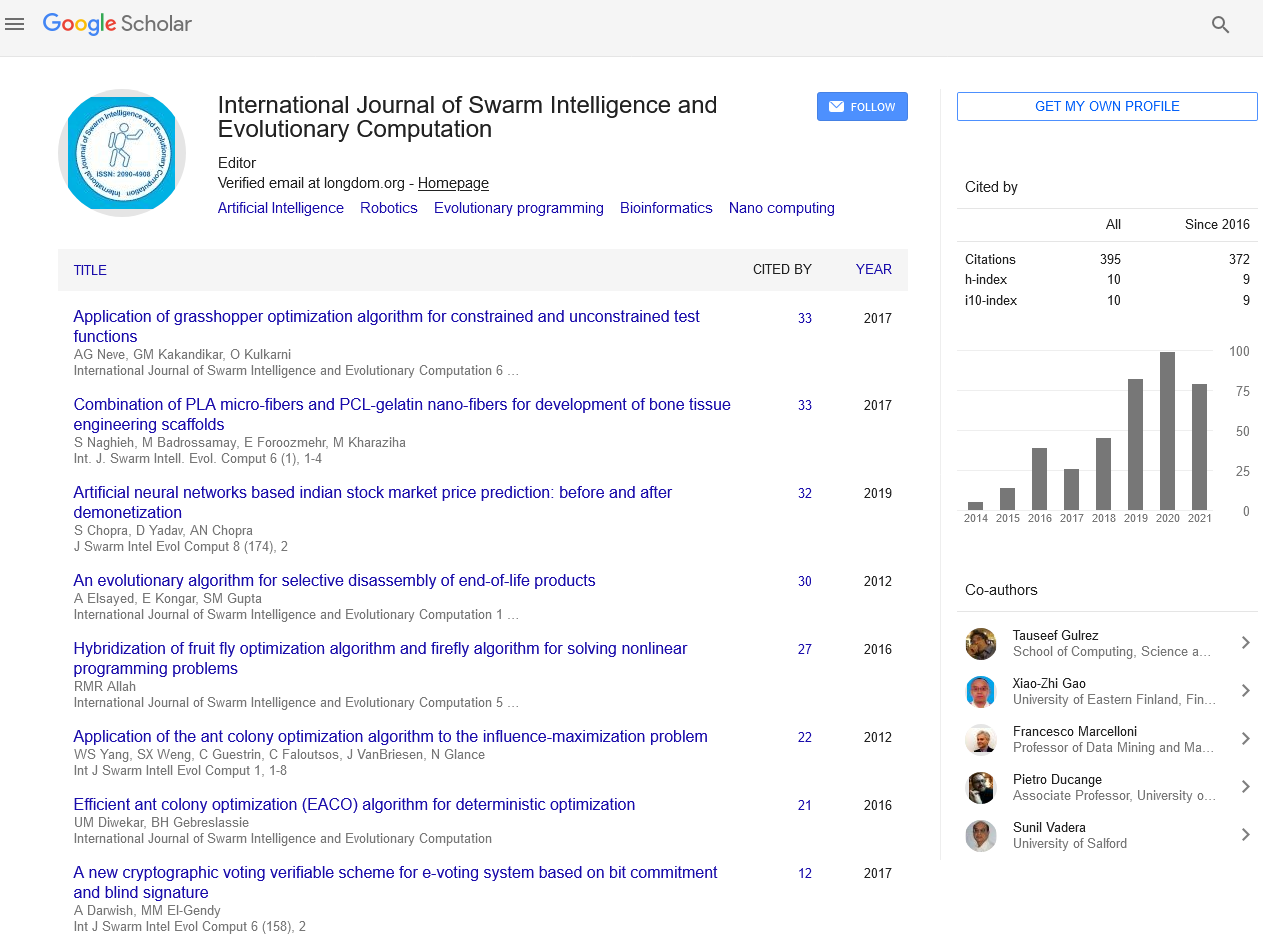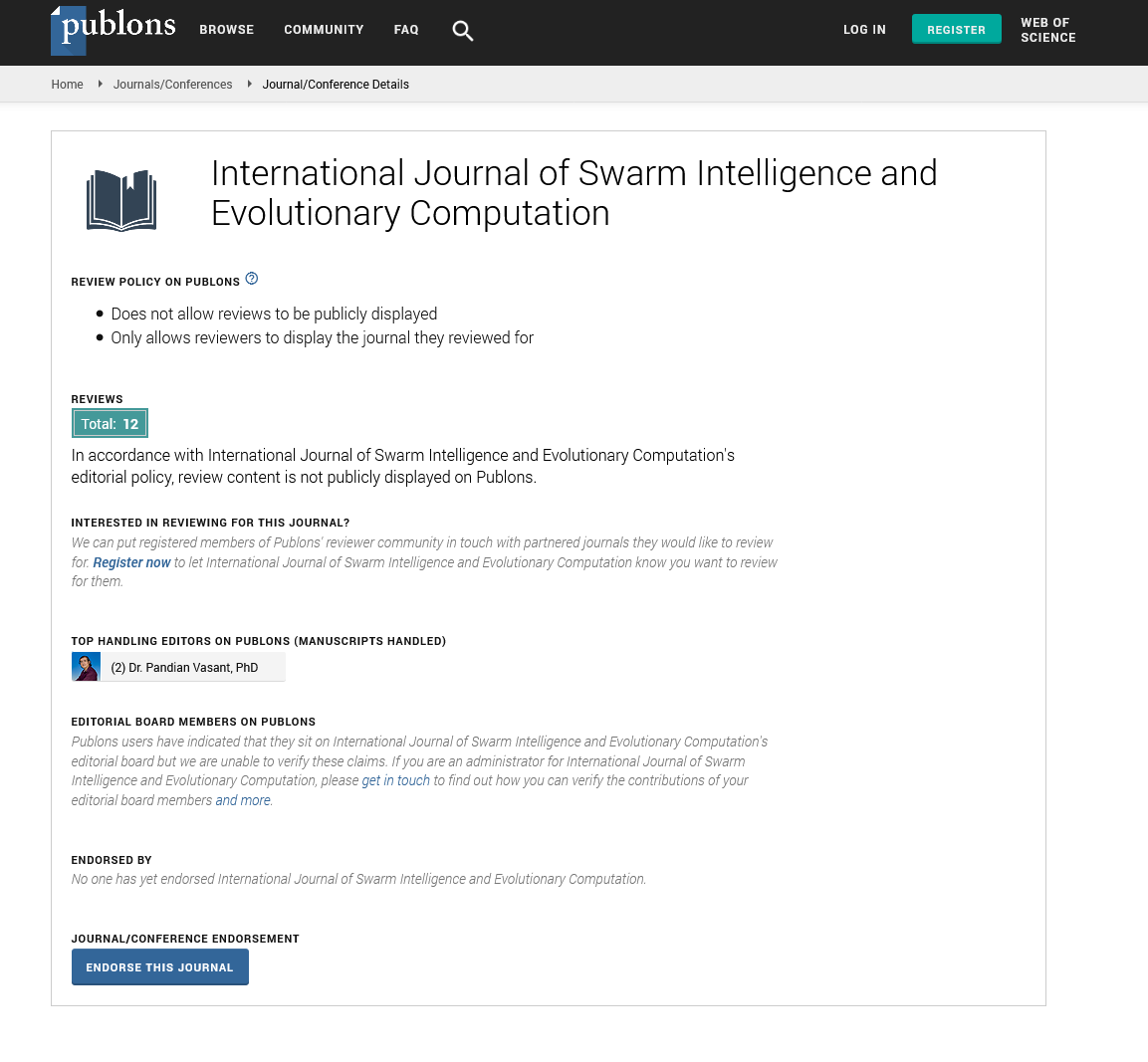Indexed In
- Genamics JournalSeek
- RefSeek
- Hamdard University
- EBSCO A-Z
- OCLC- WorldCat
- Publons
- Euro Pub
- Google Scholar
Useful Links
Share This Page
Journal Flyer

Open Access Journals
- Agri and Aquaculture
- Biochemistry
- Bioinformatics & Systems Biology
- Business & Management
- Chemistry
- Clinical Sciences
- Engineering
- Food & Nutrition
- General Science
- Genetics & Molecular Biology
- Immunology & Microbiology
- Medical Sciences
- Neuroscience & Psychology
- Nursing & Health Care
- Pharmaceutical Sciences
Editorial - (2020) Volume 9, Issue 3
Advancements in Swarm Intelligence
Kazuhko Fucikawa Associate Professor*Received: 22-Apr-2020 Published: 18-May-2020, DOI: 10.35248/2090-4908.20.9.e182
Editorial
Journal of Swarm Intelligence and Evolutionary Computation (SIEC) is a refereed all Engineering, Computer science and Engineering journal devoted to publication of original research papers, research notes, and review articles, with emphasis on unsolved problems and open questions in all Engineering & Computer science and Engineering.
To tackle complex real world problems, scientists have been looking into natural processes and creatures-both as model and metaphor - for years. Optimization is at the heart of many natural processes including Darwinian evolution, social group behavior and foraging strategies. Over the last few decades, there has been remarkable growth in the field of nature-inspired search and optimization algorithms. Currently these techniques are applied to a variety of problems, ranging from scientific research to industry and commerce. The two main families of algorithms that primarily constitute this field today are the evolutionary computing methods and the swarm intelligence algorithms. Although both families of algorithms are generally dedicated towards solving search and optimization problems, they are certainly not equivalent, and each has its own distinguishing features.
Reinforcing each other's performance makes powerful hybrid algorithms capable of solving many intractable search and optimization problems. SIEC is an international research journal, which publishes top-level work on computational aspects of artificial Intelligence; Robotics; Modeling & Analysis of swarm particle optimization; Swarm Intelligence; Evolutionary programming & Evolutionary strategies; Genetic Algorithm & Genetic Programming; Ant colony Optimization; Bacterial Forging; Artificial Life & Digital Organisms; Bioinformatics; Evolutionary Computation; Artificial Immune System; Computing; Nano computing; Computational intelligence, etc.
SIEC Journal publishes research articles and reviews within the whole field of Engineering & Computer Science and Engineering, and it will continue to provide information on the latest trends and developments in this ever-expanding subject. Journal may occasionally publish special issues on various topics in the areas of Engineering &Computer science and Engineering, book reviews, conference reports, letters to the honorary editors, conference announcements, etc.
Dr. Alaa Sheta wishes to congratulate the authors of the published papers in SIEC. Thanks are due to the members of the Editorial Board for their precious feedback and advice. We hope that the new Journal of Swarm Intelligence and Evolutionary Computation (SIEC) will serve All Engineering & Computer science engineering research community as well as and this journal will be main media of presenting ideas and research work in their area. Suggestions to improve our efforts in order to deliver a better journal to the authors, readers and subscribers of this journal will always be appreciated.
I express my sincere thanks to the science Publishers who provided me the opportunity to edit an international journal with such a reputed publisher. The latest issue of SIEC article. The latest paper, an application of swarm intelligence for the design of Robotics and Health and Safety at Work by Jesus R. Mercader Uguina , Ana B. Muñoz Ruiz presents The paper provides an analysis of the main changes due to robotic disruption in the workplace. In particular, the article focuses on the health and safety at work taking account the EU regulatory framework as well as the international technical safety standards.
According to Rifkin [1], the impact of robotics can lead to a progressive reduction of human labor, although there is no consensus on the effects this will have on employment and our future labor markets (between 9-54% of jobs threatened according to the Opinion of the European Economic and Social Committee on Artificial Intelligence: anticipating its impact on employment to ensure a fair transition 2018/C 440/01) [2]. A clear example of these issues is the Chinese mobile phone factory Changing Precision Technology which used to be run by 650 employees, but now just 60 people get the job done, while robots take care of the rest and the human workforce will drop further to 20 employees who will be in charge of managing and maintaining this robotic machinery [3-6].
Finally, I would like to thank you, the contributors and readers for your interest in the journal and I encourage you to continue to send us your valuable feedback and ideas for further improvement of our journal.
REFERENCES
- Rifkin J. The Zero Marginal Cost Society: The Internet of Things, the Collaborative Commons, and the Eclipse of Capitalism. St. Martin's Press. 2014;1-368.
- Braidotti R. Lo posthumano. Barcelona, Gedisa. Politics and Society 2015;55: 253.
- Colomer JM. El gobierno mundial de los expertos. Barcelona, Anagrama. 2015;1-286.
- Jonas H. El principio de responsabilidad. Ensayo de una ética para la civilización tecnológica. Barcelona, Herder. 1995;58-58.
- Directive 89/391/EC, of 12 June 1989 on the introduction of measures to encourage improvements in the safety and health of workers at work.
- Directive 2006/42/EC of 17 May 2006 on machinery
Citation: Fucikawa K (2020) Advancements in Swarm Intelligence. Int J Swarm Evol Comput. 9:182. DOI: 10.35248/2090-4908/20.9.e182
Copyright: © 2020 Fucikawa K. This is an open-access article distributed under the terms of the Creative Commons Attribution License, which permits unrestricted use, distribution, and reproduction in any medium, provided the original author and source are credited


